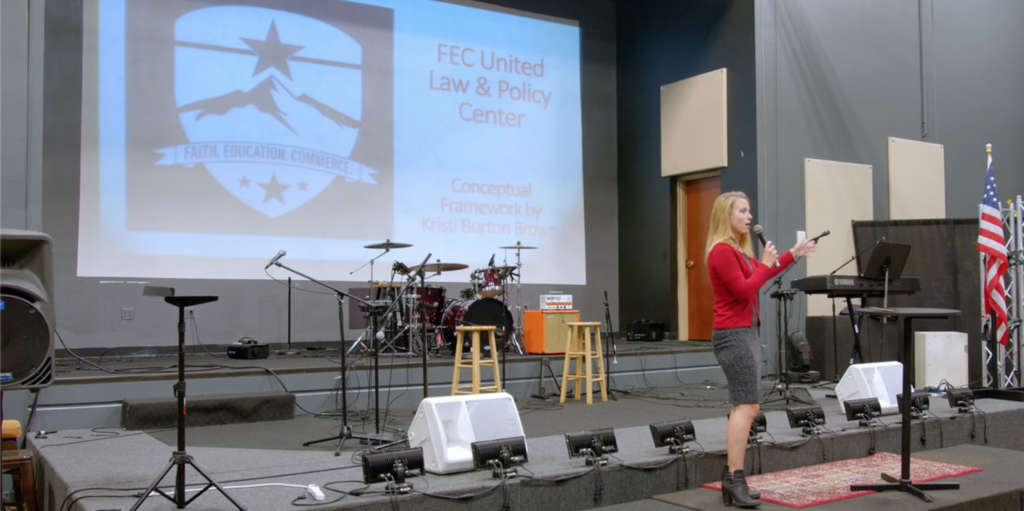Conservative activist group Advance Colorado is leading the charge against House Bill 1363, “Charter Schools Accountability.” The bill would impose additional regulations on Colorado’s charter schools, removing automatic waivers for things like teacher licensure and readiness assessments, allowing community members to appeal a local board’s decision to approve a charter school, and granting boards broader powers to revoke or not renew a charter.
“What they’re actually trying to do is kill charter schools,” said Advance Colorado Vice President Kristi Burton Brown during a Monday radio appearance on the KNUS Jeff & Bill show. Brown also made an appearance on the Ross Kaminsky show, where she identified a key point of contention with the proposed bill.
“One of the key provisions of this bill is that charter schools — their renewal can be declined if a school district sees that the neighborhood schools’ enrollment is decreasing,” said Brown. “So, again, not the charter school’s enrollment is decreasing. Charter school people could be flocking and flooding to the charter school, and if a neighborhood school’s enrollment is declining, that alone is — now, if this bill passes — reason enough to shut down a charter school.”

While charter school advocates have long supported the local control of school boards, Brown pushed back against portions of the bill that would increase local control of the charter approval process. “It actually does drastically change that appeals process because originally the Board of Education will sort of remand, to use legal language, the charter school application back down to the school district and say, ‘Hey, no, you need to reconsider this,’” she said. “If the school board declines it a second time, it actually goes back up to the Board of Education, and they get the final say. If they think it’s a great charter — should be allowed, the local district is wrong — they’re allowed to have the final say right now. What this bill would do is take that final say away from the state Board of Education and give it solely to the local school district. So basically eliminating that extra oversight that would stop heavily anti-charter local districts from banning high-performing schools. [The bill] takes that away, and says, ‘Nope. Local district can control it entirely and shut out charter schools.’”
The bill would also prohibit automatic waivers from being included in charter contracts executed or renewed on or after July 1, 2024 and prohibit a charter contract from waiving educator personnel performance evaluation system requirements. According to the Colorado Department of Education, currently 275 charter schools in Colorado — nearly all — waive teacher licensure requirements and salary schedule requirements, and 273 charter schools waive educator personnel performance evaluation system requirements.
The bill also prohibits a charter school governing board member or leader from engaging in activity or having any financial interest that might result in a conflict of interest between the board member’s or leader’s charter school duties and their personal or financial interest.
Many aspects of the bill would apply to situations Colorado school districts have faced in recent years, many of which have been covered by the Colorado Times Recorder. In 2022, the Woodland Park School Board came under scrutiny during the approval process for charter school Merit Academy. The previous school board had denied Merit’s charter request when then-board Vice President David Illingworth’s wife was a Merit Academy board member.
Woodland Park’s superintendent, Ken Witt, runs a consulting firm called the Aabren Group, which according to his CV, focuses on education policy consulting, and he has spent the past five years serving as executive director for Education reEnvisioned BOCES. BOCES are Boards of Cooperative Educational Services which exist to help two or more school districts provide services which the individual districts cannot afford to provide. Through ERBOCES, Witt has had the power to authorize, and promote various kinds of contract and online schools. It was through ERBOCES that Witt first authorized Merit as a contract school, long before it occupied a taxpayer-funded space in a Woodland Park middle school building.
Andy Franko serves as the director of operations for ERBOCES, and he also serves as the CEO of Minga Education Group, which provides staffing and HR services to charter schools. This year, Ascent Classical Academy Charter Schools, a Colorado charter school network, became the subject of a lawsuit after it fired its management group and replaced them with Minga. According to Minga’s 2021 form 990, Franko was paid $67,689 that year as CEO. According to ERBOCES’ published salary schedule, Franko earns somewhere between $110,000 and $130,000 in salary. Franko also serves as the treasurer for the Colorado Association of Charter School Authorizers.
In 2023, Elizabeth School signed a contract with Tagg Education (Tagg), an app-based service that matches a pool of users with open substitute spots. Tagg was founded in January 2018 by Trevor Miller, son of Brad Miller, a conservative attorney whose law firm represents many charter schools and school boards across the state, including Elizabeth and Woodland Park, and his cousin Andrew Lundeen, whose dad, Senator Paul Lundeen, serves on the Senate Education Committee.
Advance Colorado isn’t the only activist group opposing the bill. “We cannot stand idly by as HB24-1363 threatens to dismantle the very foundation of educational choice and opportunity in Colorado,” reads a petition website launched by Colorado Parent Advocacy Network founder Lori Gimelshteyn. “Our children deserve better. They deserve the chance to learn in environments that nurture their potential, that encourage their curiosity, and that empower them to shape their own destinies.We must rise up, unite our voices, and defend the promise of charter schools. We must remind our lawmakers that they work for us – the parents, the teachers, and the students – and that our voices cannot be silenced. Together, let us stand against HB24-1363 and fight for the future of our children, for the promise of innovation, and for the dream of a brighter tomorrow.”
“I actually don’t think the governor would sign it,” said Brown of the Charter Schools Accountability bill.
Gov. Jared Polis has been an ardent supporter of charter schools and school choice. Polis founded the New America Charter School and co-founded the Academy of Urban Learning. In 2022, Polis penned an op-ed for the Washington Post opposing additional regulations to federal funding of charter schools. Polis’ press secretary did not respond to an emailed request for comment on the proposed bill.
In addition to opposing the upcoming legislation, Advance Colorado is also working on a pro-charter ballot initiative. “So one thing Advance Colorado is working on this year, and I think getting behind, is a constitutional amendment to put the right to school choice in our Constitution,” said Brown. “It is the only way we stop the teachers unions from shuttering charter schools and taking away the right to choose educational options that best fit your own kid across the state.”
Advance Colorado’s President, Michael Fields, is a representative of the “School Choice in K-12 Education” initiative, which has been approved by the Title Board to collect signatures. If it makes it on the ballot it will require the approval of 55% of Colorado voters to pass.




